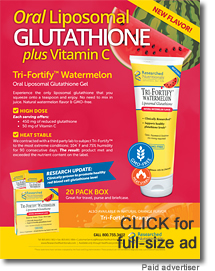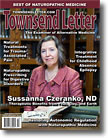Page 1, 2
Dana Ullman, MPH, CCH:
Homeopathic Research
Research showing the efficacy of homeopathic medicines has been published in many of the most respected medical journals in the world, including the Lancet,3,4 BMJ (British Medical Journal),5-7 Chest (publication of the American College of Chest Physicians),8 Rheumatology (publication of the British Society for Rheumatology),9 Pediatrics (publication of the American Academy of Pediatrics),10 Cancer (journal of the American Cancer Society),11 Pediatrics Infectious Disease Journal (publication of the European Society of Pediatric Infectious Diseases),12 European Journal of Pediatrics (publication of the Swiss Society of Pediatrics and the Belgium Society of Pediatrics),13 and numerous others.
Modern evidence for the physiological effects from homeopathic medicines is provided by a growing body of basic research that has shown up- and down-regulation of genetic expression from homeopathic medicines, including studies by Marzotto et al in 201414 and 201615; Khuda-Bukhsh16; and Bellavite et al.17 Even the highly prestigious Nature magazine edition in India18 published an important news report about one of these studies that showed these effects from a homeopathic medicine. Ultimately, at least a dozen laboratories19 have confirmed the persistence of nanomedicines in water made with homeopathic medicines, including labs at the University of Arizona,20 Northwestern University, University of California at Davis, University of Mumbai, Russian Academy of Science, and India Institute of Technology.
The largest review of research on homeopathy that has ever taken place, the Swiss government's Health Technology Assessment report on homeopathic medicine,21 is much more comprehensive than any previous governmental report written on this subject to date. Not only did this report carefully and comprehensively review the body of evidence from randomized double-blind and placebo-controlled clinical trials testing homeopathic medicines, they also evaluated the "real world effectiveness" with observational studies as well as safety and cost-effectiveness. The report also conducted a highly comprehensive review of the wide body of preclinical research (fundamental physiochemical research, botanical studies, animal studies, and in vitro studies with human cells) as well as epidemiological studies and cost-effectiveness studies.
After assessing basic research and the high quality clinical studies, the Swiss report affirmed that homeopathic high-potencies seem to induce regulatory effects (e.g., balancing or normalizing effects) and specific changes in cells or living organisms. The report also reported that 20 of the 22 systematic reviews of clinical research testing homeopathic medicines detected at least a trend in favor of homeopathy.
The newest meta-analysis (a systematic review of research) on homeopathic medicine22 chose to evaluate only those clinical trials that provided individualized treatment. In reviewing the "highest quality studies," the researchers found that homeopathic patients were almost twice as likely to experience a therapeutic benefit as those given a placebo. Further, in reviewing a total of 22 clinical trials, the homeopathic patients experienced greater than 50% likelihood to have benefited from the homeopathic treatment than those given a placebo.
One of the strongest statements in this article was the confirmation that four of the five leading previous systematic reviews of homeopathic research also found a benefit from homeopathic treatment over that of placebo: "Five systematic reviews have examined the RCT research literature on homeopathy as a whole, including the broad spectrum of medical conditions that have been researched and by all forms of homeopathy: four of these ‘global' systematic reviews reached the conclusion that, with important caveats, the homeopathic intervention probably differs from placebo."
The ultimate observation of this significant review of homeopathic research is that there IS a difference between homeopathy and placebo, despite what skeptics and the media tend to assume and assert.
Richard Moskowitz, MD:
For Homeopathy: A Practicing Physician's Perspective
The basic "law" of homeopathy, the phenomenon that medicines tend to elicit or provoke the same symptoms that they are meant to relieve, is widely familiar even in allopathic circles where "paradoxical" effects, such as antihypertensives raising blood pressure (e.g., Catapres), antidepressants making depression worse to the point of suicide (e.g., Prozac), and so on, are commonplace and well-documented in standard reference texts like the Physicians' Desk Reference.
 No matter what the correct explanation of these mysteries may prove to be, it is also undeniably true that dedicated physicians have continued to follow the same principles and to practice medicine on the basis of them for more than two hundred years, and now do so on every continent and in most countries of the world. In the face of determined opposition, general ridicule, and the sacrifice of more prominent and lucrative careers, the mere fact that homeopathic medicine has managed to survive intact for so long, and even continued to grow and develop under such adverse conditions speaks for itself. Its singular propensity to attract qualified doctors from almost every country at a time when allopathic medicine has become the dominant model of health care in the world represents not only a significant historical achievement in its own right but also a persuasiveargument for the validity of the Law of Similars, the efficacy of Hahnemann's infinitesimal doses, and the ultimate authenticity of the homeopathic phenomenon itself. No matter what the correct explanation of these mysteries may prove to be, it is also undeniably true that dedicated physicians have continued to follow the same principles and to practice medicine on the basis of them for more than two hundred years, and now do so on every continent and in most countries of the world. In the face of determined opposition, general ridicule, and the sacrifice of more prominent and lucrative careers, the mere fact that homeopathic medicine has managed to survive intact for so long, and even continued to grow and develop under such adverse conditions speaks for itself. Its singular propensity to attract qualified doctors from almost every country at a time when allopathic medicine has become the dominant model of health care in the world represents not only a significant historical achievement in its own right but also a persuasiveargument for the validity of the Law of Similars, the efficacy of Hahnemann's infinitesimal doses, and the ultimate authenticity of the homeopathic phenomenon itself.
I have practiced general and family medicine for 44 years. For the past 37 years, I have treated my patients with homeopathic remedies exclusively, not because I believe that pharmaceutical drugs have no value; I often refer patients whom I've not been able to help to my allopathic colleagues and am more than grateful for what they do. I choose to practice homeopathy, in part, because I prefer to try a gentler and safer approach first, whenever possible, but mainly because matching the treatment to the individuality of the patient allows and encourages a deeper and more comprehensive level of healing than is possible with conventional drugs.
I will give a few examples from the early years of my practice. The first was an eight-pound baby girl who was born covered with thick meconium, took one gasp, and then breathed no more. Brisk suctioning produced only more of the same. At this point the child lay limp, white, and motionless with a heartbeat of 40 per minute, responding feebly to mouth-to-mouth resuscitation but incapable of breathing on her own. I put a few tiny granules of homeopathic Arsenicum album 200C on her tongue. Almost instantaneously she awoke with a jolt, crying and flailing, her heart pounding at 140 per minute, her skin glowing pink with the flame of new life. The whole evolution took no more than a few seconds. After a night in the hospital to be on the safe side, mother and baby went home in the morning with no outward sign that anything untoward had happened. Experiences like these are imprinted for life in every practitioner's mind.
Of course, I am well aware that this could have happened spontaneously without any remedies at all, for the child was well-formed and appeared normal in every other respect; and anyway, it was just one patient, a mere "anecdote," utterly without statistical significance. But all of us who were present, including my nurse, the baby's mother and father, and I daresay the child herself, by now fully-grown and undoubtedly steeped in the legend of her birth, know as surely as we can know anything that the conjunction of the infinitesimal dose and her abrupt awakening was no mere coincidence.
My second case was that of a 34-year-old RN who had been plagued with severe endometriosis since her teens. Already a veteran of four surgeries to remove large blood-filled cysts from her bladder and pelvic organs and several courses of male hormones to suppress the condition, she came seeking only to restore her menstrual cycle, having long since abandoned any hopes of childbearing. While intensely painful at first, her periods had become "dead," dark-brown, and scanty from so many years of surgery and hormonal treatments in the past.
After a few doses of homeopathic medicines, her menstrual flow became fuller and richer; and within six months, she was pregnant. By the next time I saw her for a different ailment nearly eight years later, she had had two healthy children after uncomplicated pregnancies and normal vaginal births and had remained in good health ever since. While no one can attribute such an outcome to homeopathy or any other agency in precise, linear fashion, my patient has never stopped thanking me for it. This is reason enough to be grateful for a process that is inherently catalytic and persuasive, rather than forcible or compulsory.
Still less can these happy endings be imputed to any unusual skill of mine since they are entirely comparable to what every competent prescriber has seen or could easily duplicate, and I could just as well have cited other patients whose conditions were far from hopeless, who believed in homeopathy and in me, but whom I was nevertheless unable to help.
To be sure, homeopathy is far from a panacea for all ills. Homeopathy is a difficult and exacting art; and even after years of study and practice, a skilled prescriber may need to try several medicines before obvious benefit is obtained. In some cases, despite the most dedicated efforts, there is little or no benefit at all. But if the ultra-dilute medicines can be seen to have worked well and often enough to sustain me in a general practice for 45 years, like so many others over the past two centuries, that, too, is more than enough to refute assumptions that they are no treatment at all.
Although deeply flattered by the common insinuation that we heal our patients solely by some kind of magic or shamanic spell that we cast over them unawares, I continue to believe what my experience has taught me, that the "placebo effect" – that starved and tattered remnant of the innate self-healing capacity – is an essential component of all healing, even with pharmaceuticals, but by no means the whole of it.
Page 1, 2
References .pdf
Judyth Reichenberg-Ullman, ND, MSW and Robert Ullman, ND are licensed naturopathic physicians, board-certified in homeopathy, in practice for over 33 and 35 years. Columnists for the Townsend Letter for 27 years, they are also authors of eight books on homeopathy. They practice at The Northwest Center for Homeopathic Medicine in Edmonds, Washington 425-774-5599. The doctors treat patients in person and by phone or videoconference: www.healthyhomeopathy.com
Dana Ullman, MPH, CCH, has authored ten books on homeopathy (see www.homeopathic.com for details) and has created a new e-course on "Learning to use a homeopathic medicine kit" (Continuing Education units for MDs/Category I, RNs, and other health professionals. See www.HomeopathicFamilyMedicine.com for details).
Richard Moskowitz, MD, age 77, has practiced homeopathic family medicine exclusively since 1974. He is the author of Homeopathic Medicines in Pregnancy and Childbirth (1992), Resonance: The Homeopathic Point of View (2001); Plain Doctoring: Selected Writings, 1983-2013 (2014), More Doctoring: Selected Writings, Vol. 2, 1980-2014 (2015), and Vaccines: a Reappraisal (2017). |
![]()
![]()
![]()






